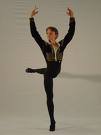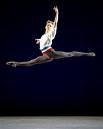Daniil Simkin - Interview at the International Ballet Competition - Jackson, MS - June 2006

Daniil Simkin - Interview at the International Ballet Competition - Jackson, MS - June 2006
19 January 2010 at 17:15
 Daniil Simpkin at the International Ballet Competition - Jackson, MS - June 2006
Daniil Simpkin at the International Ballet Competition - Jackson, MS - June 2006
The biggest story at the VIII USA International Ballet Competition in Jackson, Mississippi this past June was the impressive virtuosity of the young male dancers. CDA (Classical Dance Alliance) interviewed three medalists on the brink of promising careers who dazzled judges and attendees, and we strongly suspect will be thrilling ballet audiences in the very near future. We invited them to talk about their training, aspirations, and diverse perspectives on a life in Classical Dance.
DANIIL SIMKIN, 19
 Men's Gold Medal, Senior Division
Men's Gold Medal, Senior Division
Coach: Mother Olga Aleksandrova Simkin
Birthplace: Novosibirsk, Russia
Home: Wiesbaden, Germany
Academic Schooling: Attended regular school
Ballet Training:
Olga Aleksandrovna Simkin
Other Recent Accolades:
Grand Prix
 Helsinki Int'l Ballet Competition 2005
Helsinki Int'l Ballet Competition 2005
First Prize
Varna Int'l Ballet Competition 2004
Variations Performed that Conformed to the
VIII USA International Ballet Competition Repertoire
June 17 through July 2, 2006
Jackson, Mississippi
DANIIL SIMKIN - #103
 Round I, Senior Division (all competitors), Germany
Round I, Senior Division (all competitors), Germany
Solo: Giselle, Act II
Composer: Adolphe Adam
Choreographer: Jules Perrot / Jean Coralli
Solo: Don Quixote, Grande Pas de Deux
Composer: Ludwig Minkus
Choreographer: Marius Petipa
Round II, Senior Division (semi-finalist), Germany
Solo: Moorhuhn
 Music: Pictures at an Exhibition
Music: Pictures at an Exhibition
Composer: Modest Mussorgsky
Choreographer: Dimitrij Simkin
Round III, Senior Division (finalist), Germany
Solo: Les Bourgeois
Music: Les Bourgeois
Composer: Jacques Brel
Choreographer: Ben Van Cauwenbergh
Solo: Sleeping Beauty, Grand Pas de Deux, Act III
 Composer: Peter Ilyich Tchaikovsky
Composer: Peter Ilyich Tchaikovsky
Choreographer: Marius Petipa
Solo: Le Corsaire, Medora and the Slave
Composer: Riccardo Drigo
Choreographer: Marius Petipa / Vakhtang Chabukiani
INTERVIEW
How did you get started in Classical Dance?
DANIL: I was born in Russia. Both my parents were Ballet Dancers. When I was two we moved to Germany. When I was 9 my mother Olga Aleksandrova Simkin started to teach me privately every day in a studio at a theater in Wiesbaden. From when I was 6, I stood on the stage and danced small things in performances. And then came the point when my mother said, “You're not a kid anymore. You have to get technique. You have to get the base.” And I often dance alongside my father Dmitrij Simkin; he's also a ballet dancer. He still dances. He graduated from the Moscow Choreographic School (Bolshoi Academy). Then he danced with Novosibirsk. And when I was two we moved to Germany. He danced at Dusseldorf, and he dances still at the Wiesbaden Opera. He couldn't come to this competition because he has a premiere. He's dancing, he did the stage design, the video projection, arranged the music, the concept for the production.
Can you tell us about your ballet training?
DANIL: If you had asked a lot of people if a mother could train her son, they would have said it's not possible. She's been teaching me now for ten years. She coached me for this competition. The contemporary piece that I will dance, Les Bourgeois, was originated for my father. My mother is a good pedagogue. Her teaching style suits me very well. She has a Russian base but when she arrived in the West she saw a lot of things and kept developing. She finished her pedagogical degree in the Ukraine just four years ago because she needed this certification to work as Director of the Frankfort Conservatory. Her teacher was Alisa Nikiforova, a graduate of the last class of Vaganova and a student of Vera Kostrovitskaya. Nikiforova is still alive in Berlin and my mother always sends her our videos of me. She is very critical but she likes me.
What advice would you have for aspiring young dancers?
DANIL: A ballet dancer has to continue doing classes. If you have the base of good training you can keep constructing on it. I just learned some Bournonville combinations from a video. You can copy what you see and try your best to learn it. To watch is very important for a ballet dancer. A lot of companies come to Frankfort and we always watch and educate ourselves.
What special insights can you share based on your own experiences as a Classical Dancer?
DANIL: In school only a few people know I am in ballet. I'm in a regular high school and ballet is not popular. If I were playing football at this level, everyone would go crazy. It's been really hard but I wanted to stay at home and earn my high school degree and have a normal education in the normal subjects. I did well enough to study whatever I want now. It would have been a pity if I didn't do it. My main subjects were English and Art. I loved mathematics. If I didn't do ballet, I would do photography or painting. Normally if you're dancing at a competition level, you're completely focused on ballet. But I try to be open and have not only ballet in my life - and that's important.
What are your aspirations on the brink of your career as a dance professional
DANIL: I would love to dance all the classical roles-all the princes, or demi-character roles like Bazilio, like Ali. But I would like to grow as an artist and do modern roles, too, like Kylian, like Mats Ek. I'd really love to do some Balanchine, and Bournonville of course. I would like to do everything.
What's next for you after this competition?
DANIL: I'm going to dance for the Vienna Opera Ballet. There were two companies and they merged. I know the director quite well. He had invited me to galas in Budapest, where he is the former director. It's a big company and it's just on the rise. There are more than a hundred members and they have a good repertoire - all the classics are on one stage and a lot of modern is on the other stage. It's a good opportunity and not far away from my family in Germany, so I can go there weekends, or whatever. They took me as a demi-soloist, and they have no principals so it's really like being a soloist. They have the corps de ballet and demi-soloists and soloists. So I'm joining as kind of a soloist and can get my experience fast without waiting years to get some roles. I get the opportunity immediately to dance.
Sources :
http://www.classicaldancealliance.org/Features/interview/RisingMaleStars/index.html
http://www.classicaldancealliance.org/Features/interview/RisingMaleStars/Simkin_Gallery/Simkin.html
More up to date info and videos on his website, youtube channel, twitter feed and facebook page :
https://www.facebook.com/daniilsimkinfans
http://daniilsimk.in
http://twitter.com/daniil
http://youtube.com/daniils
Interview 2009 from 'The Ballet Bag' on life, ballet, technology and the use of social media : http://www.theballetbag.com/2009/11/09/an-interview-with-daniil-simkin/
Interview 2010 from 'Madame B' http://madamebnyc.blogspot.com/2010/04/man-about-town-daniil-simkin.html
Interview Aug 2010 Interview with Dance Pulp http://www.youtube.com/watch?v=CYF9ldvmnMs
BIOGRAPHY
Daniil Simkin (born 12 October 1987 in Novosibirsk) is a Russian ballet dancer. His parents Dmitrij Simkin and Olga Aleksandrova are also ballet dancers. The family left the Soviet Union in 1990. His parents were engaged to dance in Graz, then took engagements in various cities in Germany before settling in Wiesbaden in 1993, where he spent the rest of his childhood.
Unlike most professional ballet dancers Simkin did not attend a vocational ballet school. He was coached privately by his mother, who became a ballet teacher after retiring from dancing in 1999, while attending regular German high school. He also danced duets with his father, and gained stage experience by appearing in ballet productions in Wiesbaden as a child. As a teenager he won first prize in several of the world's leading ballet competitions.
Simkin's first professional position was with the Vienna State Opera Ballet, where he was a demi-soloist from 2006 to 2008. During this time he made his debut in a principal role as a guest with the Lithuanian National Ballet. In 2008 he became a soloist at the American Ballet Theatre in New York. He is a regular award winner on the international ballet gala circuit, and presented his own gala in Athens in 2009 in collaboration with his father, who now works as a choreographer and stage designer.
Simkin is often spoken of as one of the most significant male talents to emerge in ballet in recent years. He is relatively small and lightly built, and of a youthful demeanour, but he is noted for his exceptional jumps, the speed and precision of his pirouettes, and his instinctive communication with the audience.
Simkin has been noted as one of the first ballet dancers to be active in Web 2.0 media such as YouTube and twitter, and has spoken in interviews about the need for ballet to open up, demystify itself and modernize the way it connects with audiences.